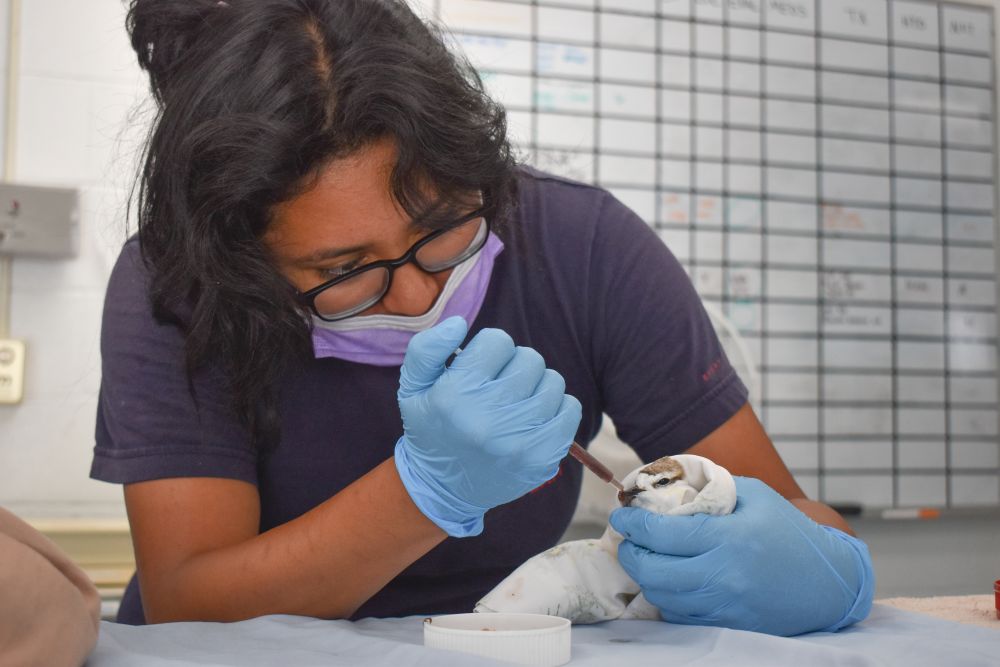For Jennifer Martines (‘17, Wildlife), a love of animals started in a neighborhood library in Los Angeles, where librarians would hand her books about wildlife. That childhood curiosity, nurtured by hard-working parents who worked two jobs to support her, eventually led her to Cal Poly Humboldt—and later, to national recognition on “The Kelly Clarkson Show.”
Her compassion and commitment were recently featured on the show’s “What I’m Liking” segment, where Martines emphasized the importance of tuning in to the world around us: “Remember to look up and be inspired by the wildlife around you,” she said.
Martines’ heart has always been set on helping animals.
Today, she serves as the Senior Wildlife Rehabilitation Technician at International Bird Rescue in San Pedro, California. She’s been on the frontlines of climate-related wildlife emergencies, from mass seabird strandings to urban ecosystem disruptions.
A first-generation college student, Martines’ journey to Humboldt was a leap into the unknown. “I always wanted to work with animals, but I didn’t know how,” she says. Attracted by Humboldt’s affordability, natural beauty, and nationally recognized wildlife program, she chose it over out-of-state options. “It was a match of everything—location, affordability, family proximity, and opportunity.”
Though she grew up in a bustling urban neighborhood and had never hiked or camped before, Martines found herself immersed in the outdoors at Cal Poly Humboldt. Thanks to the University’s Outdoor Adventure gear rental program and local recreation groups, she tried kayaking, backpacking, and hiking for the very first time.
“It was all so accessible, and I wasn’t alone—I was learning alongside other first-timers,” she recalls.
Martines also found inspiration in the classroom. She credits professors like Barbara Clucas, Matt Johnson, and Michaela Szykman Gunther for cultivating a hands-on, place-based education.
“They made learning immersive,” she says. “We studied at the Humboldt Bay National Wildlife Refuge, in Blue Lake, and even on campus. They helped me see that ecosystems—and the people who care for them—are everywhere.”
Outside of academics, she found a strong sense of belonging in Cyprus Hall, where she met her closest friends.
“We were all from different majors, but we’d come together to cook, garden, and talk about missing home. It became our little found family,” Martines says.
Her time at Humboldt encouraged deep self-reflection and growth.
“Being away from my family for the first time made me ask, ‘What are my thoughts? What are my priorities?’” Martines says. The habits she built—like study routines and even her craving for J Dining Hall’s breakfast burritos—still stay with her today.
Beyond the classroom, Martines volunteered and worked with Sequoia Park and Friends of the Dunes, gaining hands-on experience with animal care.
“Humboldt gave me space to grow and explore in a nurturing environment,” she says. “It shaped who I am—professionally and personally.”
Martines began at International Bird Rescue as an intern in 2018 and worked her way up to senior technician. Her work centers on caring for urban wildlife—animals injured by cars, caught in fishing lines, or affected by pollution.
In May 2025, she played a key role in responding to three simultaneous wildlife emergencies. First, she cared for an orphan colony of double-crested cormorants after a tree was cut down in an urban park. Second, she addressed a harmful algal bloom along the Pacific coast that was affecting adult California brown pelicans with domoic acid, a neurotoxin associated with warming oceans, causing seizures and paralysis. Lastly, she assisted a large influx of young pelicans that had fledged too early and were stranded and starving.
“No two emergencies are ever the same,” Martines says. “Every event pushes me to apply everything I’ve learned in new ways. You’re constantly growing, and every bird is an individual.”
Her work has taken her across the globe. After graduating, she worked with plovers in China and later traveled to South Africa as a newly hired to help rescue thousands of flamingo chicks abandoned during a severe drought.
“It was a global effort,” she says. “Despite language barriers, we came together through a shared love for bird care.”
Martines proudly identifies as an urban wildlife technician.
“Cities are thriving ecosystems. I learned that from Professor Clucas in urban ecology,” she says. “We often think wildlife only lives in remote places, but gulls, pelicans, even owls—they’re all adapting to life in the city. Protecting these animals is just as important.”
She encourages current and future Humboldt students to embrace every opportunity. “Humboldt helped me grow into who I am today. It gave me space to explore, fail, learn, and try again.”
For those considering studying wildlife at Cal Poly Humboldt, her message is simple: “Do it. And remember, you don’t have to go far to find wildlife. Start by looking up.”
Watch Martines’s segment on “The Kelly Clarkson Show:” https://youtu.be/ay6jm7-TaGc
Photo caption: Jennifer Martines (‘17, Wildlife) washes a common loon. Every year, International Bird Rescue brings these birds to their center due to natural oil seepage off the coast of California. This oil seepage occurs during the winter, coinciding with rainfall and wave movement, which aligns with the migration of these loons to the California coast. This is one of the reasons why the center was established in Los Angeles: to assist with the rescue of birds affected by oil spills.

